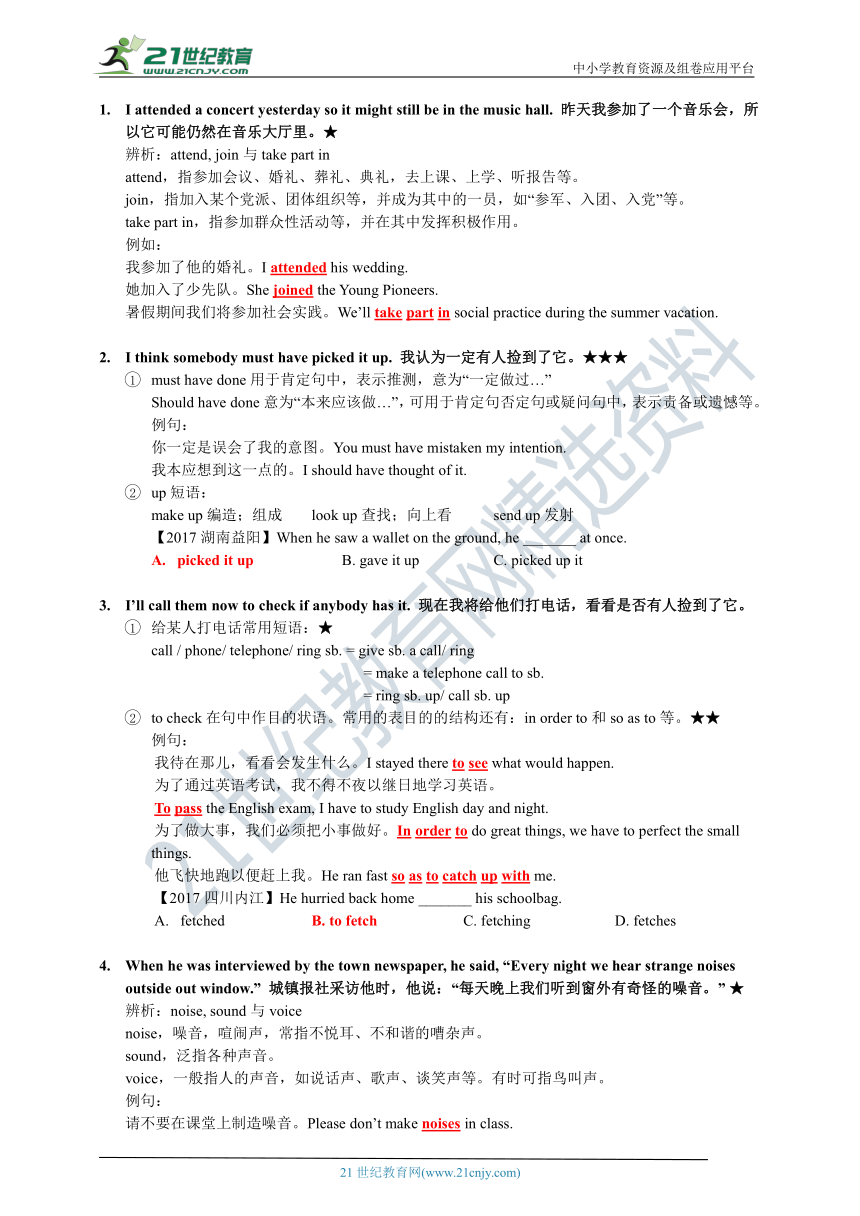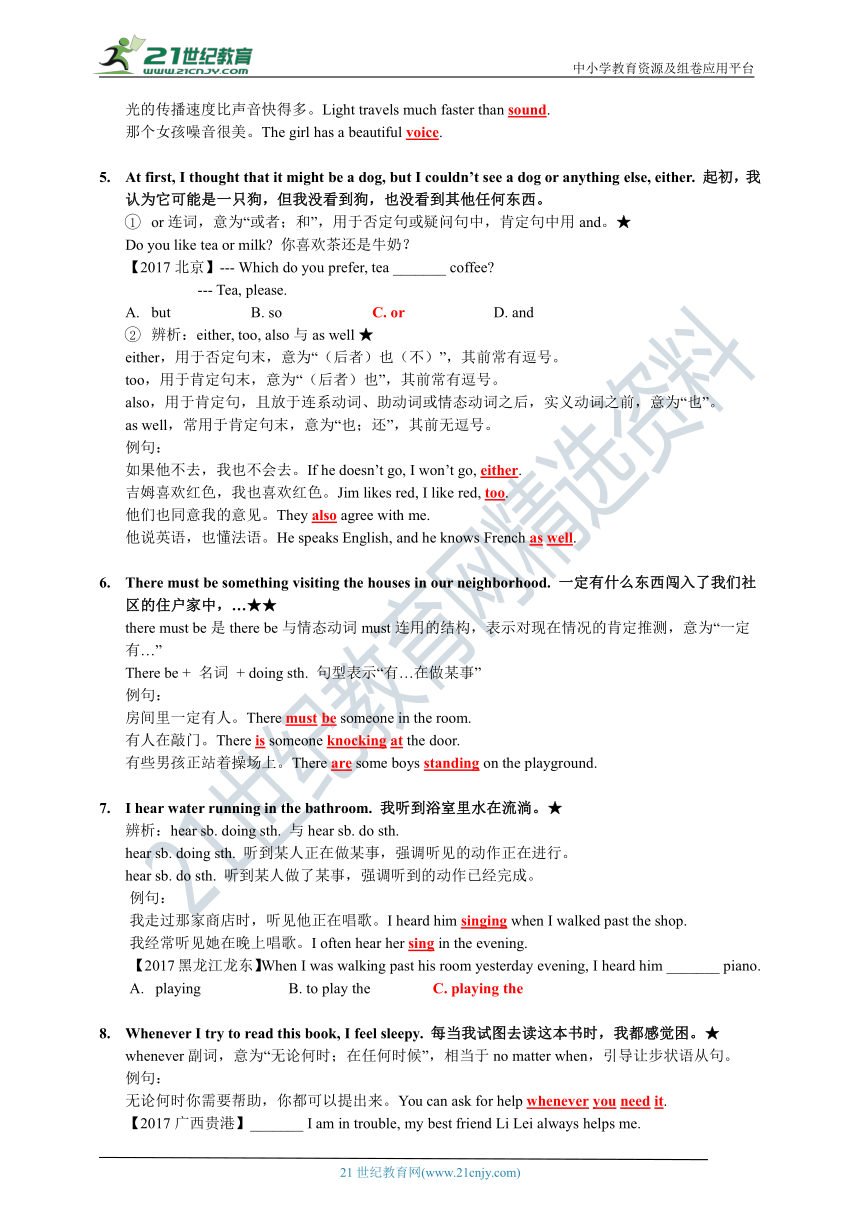Unit 8 It must belong to Carla. 单元知识点讲义
文档属性
| 名称 | Unit 8 It must belong to Carla. 单元知识点讲义 |  | |
| 格式 | zip | ||
| 文件大小 | 1.2MB | ||
| 资源类型 | 试卷 | ||
| 版本资源 | 人教新目标(Go for it)版 | ||
| 科目 | 英语 | ||
| 更新时间 | 2020-02-05 20:20:40 | ||
图片预览



文档简介
中小学教育资源及组卷应用平台
Unit 8 It must belong to Carla. 单元知识点讲义
一、词性转换
Section A
valuable→ (n.) value
happening → (v.) happen
noise→ (adj.) noisy
uneasy → (反义词.) easy
laboratory → (缩写.) lab
sleepy → (v.) sleep
Section B
suit → (adj.) suitable
express → (n.) expression
Britain → (adj.) British
mystery → (adj.) mysterious
historian → (adj.) historical
leader → (v.) lead
medical → (n.) medicine
energy → (adj.) energetic
burial → (v.) bury
honor → (adj.) honorable
二、短语归纳
belong to属于
at the picnic在野餐中
attend a concert参加音乐会
pick up 捡起
nothing much没什么事
call the policemen报警
at first起初
in the neighborhood在社区里
go away离开
feel sleepy感觉困倦的
run after追赶
express a difference表达差异
communicate with sb. 和某人交流
arrive in + 大地点 到达某地
prevent illness预防疾病
keep healthy保持健康
point out指出
a victory over an enemy战胜敌人
wait for等待
be late for迟到
on the phone通过电话
三、句型集萃
What’s wrong with …? …怎么了?
used to do sth. 过去常常做某事
see sb. doing sth. 看见某人正在做某事
have fun doing sth. 做某事有乐趣
could/ might be doing sth. 可能正在做某事
try to do sth. 尽力做某事
stop sb. from doing sth. 阻止某人做某事
must have done 一定已经做了…
one of + the + 形容词的最高级+名词复数形式 最…的…之一
重点句子
I attended a concert yesterday so it might still be in the music hall. 昨天我参加了一个音乐会,所以它可能仍然在音乐大厅里。★
辨析:attend, join与take part in
attend,指参加会议、婚礼、葬礼、典礼,去上课、上学、听报告等。
join,指加入某个党派、团体组织等,并成为其中的一员,如“参军、入团、入党”等。
take part in,指参加群众性活动等,并在其中发挥积极作用。
例如:
我参加了他的婚礼。I attended his wedding.
她加入了少先队。She joined the Young Pioneers.
暑假期间我们将参加社会实践。We’ll take part in social practice during the summer vacation.
I think somebody must have picked it up. 我认为一定有人捡到了它。★★★
must have done用于肯定句中,表示推测,意为“一定做过…”
Should have done意为“本来应该做…”,可用于肯定句否定句或疑问句中,表示责备或遗憾等。
例句:
你一定是误会了我的意图。You must have mistaken my intention.
我本应想到这一点的。I should have thought of it.
up短语:
make up编造;组成 look up查找;向上看 send up发射
【2017湖南益阳】When he saw a wallet on the ground, he _______ at once.
picked it up B. gave it up C. picked up it
I’ll call them now to check if anybody has it. 现在我将给他们打电话,看看是否有人捡到了它。
给某人打电话常用短语:★
call / phone/ telephone/ ring sb. = give sb. a call/ ring
= make a telephone call to sb.
= ring sb. up/ call sb. up
to check在句中作目的状语。常用的表目的的结构还有:in order to和so as to等。★★
例句:
我待在那儿,看看会发生什么。I stayed there to see what would happen.
为了通过英语考试,我不得不夜以继日地学习英语。
To pass the English exam, I have to study English day and night.
为了做大事,我们必须把小事做好。In order to do great things, we have to perfect the small things.
他飞快地跑以便赶上我。He ran fast so as to catch up with me.
【2017四川内江】He hurried back home _______ his schoolbag.
fetched B. to fetch C. fetching D. fetches
When he was interviewed by the town newspaper, he said, “Every night we hear strange noises outside out window.” 城镇报社采访他时,他说:“每天晚上我们听到窗外有奇怪的噪音。” ★
辨析:noise, sound与voice
noise,噪音,喧闹声,常指不悦耳、不和谐的嘈杂声。
sound,泛指各种声音。
voice,一般指人的声音,如说话声、歌声、谈笑声等。有时可指鸟叫声。
例句:
请不要在课堂上制造噪音。Please don’t make noises in class.
光的传播速度比声音快得多。Light travels much faster than sound.
那个女孩噪音很美。The girl has a beautiful voice.
At first, I thought that it might be a dog, but I couldn’t see a dog or anything else, either. 起初,我认为它可能是一只狗,但我没看到狗,也没看到其他任何东西。
or连词,意为“或者;和”,用于否定句或疑问句中,肯定句中用and。★
Do you like tea or milk? 你喜欢茶还是牛奶?
【2017北京】--- Which do you prefer, tea _______ coffee?
--- Tea, please.
but B. so C. or D. and
辨析:either, too, also与as well ★
either,用于否定句末,意为“(后者)也(不)”,其前常有逗号。
too,用于肯定句末,意为“(后者)也”,其前常有逗号。
also,用于肯定句,且放于连系动词、助动词或情态动词之后,实义动词之前,意为“也”。
as well,常用于肯定句末,意为“也;还”,其前无逗号。
例句:
如果他不去,我也不会去。If he doesn’t go, I won’t go, either.
吉姆喜欢红色,我也喜欢红色。Jim likes red, I like red, too.
他们也同意我的意见。They also agree with me.
他说英语,也懂法语。He speaks English, and he knows French as well.
There must be something visiting the houses in our neighborhood. 一定有什么东西闯入了我们社区的住户家中,…★★
there must be是there be与情态动词must连用的结构,表示对现在情况的肯定推测,意为“一定有…”
There be + 名词 + doing sth. 句型表示“有…在做某事”
例句:
房间里一定有人。There must be someone in the room.
有人在敲门。There is someone knocking at the door.
有些男孩正站着操场上。There are some boys standing on the playground.
I hear water running in the bathroom. 我听到浴室里水在流淌。★
辨析:hear sb. doing sth. 与hear sb. do sth.
hear sb. doing sth. 听到某人正在做某事,强调听见的动作正在进行。
hear sb. do sth. 听到某人做了某事,强调听到的动作已经完成。
例句:
我走过那家商店时,听见他正在唱歌。I heard him singing when I walked past the shop.
我经常听见她在晚上唱歌。I often hear her sing in the evening.
【2017黑龙江龙东】When I was walking past his room yesterday evening, I heard him _______ piano.
playing B. to play the C. playing the
Whenever I try to read this book, I feel sleepy. 每当我试图去读这本书时,我都感觉困。★
whenever副词,意为“无论何时;在任何时候”,相当于no matter when,引导让步状语从句。
例句:
无论何时你需要帮助,你都可以提出来。You can ask for help whenever you need it.
【2017广西贵港】_______ I am in trouble, my best friend Li Lei always helps me.
Whenever B. Whatever C. However D. Never
He could be running for exercise. 他可能为了锻炼身体而在跑步。★★★
could be running是could be doing结构,表示对正在进行或发生的事情的推测。
例句:我认为他可能正在家看电视。I think he could be watching TV at home.
exercise作可数名词,意为“体操;练习题”;
exercise作不可数名词,意为“运动;锻炼”
例句:
做早操/ 眼保健操 do morning/ eye exercises
我们每天做许多练习题。We do many exercises every day.
他每天都做运动。He takes exercise every day.
“The leaders arrived in England much later,” he points out. “这些领导人抵达英国晚得多,”他指出。★
① 辨析:arrive, reach与get to
arrive是不及物动词,与地点名词连用时须跟介词at或in。其中arrive at后跟小地点,arrive in后跟大地点。
reach是及物动词,可直接与表地点的名词连用。
get to后接表示地点的名词,多用于口语中。get to后跟home, here与there时,to一定要省略!
例句:
我们到车站晚了5分钟。We arrived at the station five minutes late.
他是昨天到达北京的。He reached Beijing yesterday.
我们昨晚到达这儿的。We got here last night.
② 辨析:point out, point at与point to
point out 指出,给某人之处方向、要点或错误等。
point at 指着,着重于指的对象。
point to 指向,着重于指的方向。
例句:
请你指出那个救男孩生命的人好吗?Will you please point out the man who saved the boy’s life?
读书时不要用手指着字。Don’t point at the words while you are reading.
他指着河对岸的房子说:“那是我家。”
He pointed to the house on the other side of the river and said, “That’s my home.”
They think the stones can prevent illness and keep people healthy. 他们认为这些石头能够预防疾病,并使人们保持健康。★★
prevent及物动词,意为“阻止;阻挠”,常构成“prevent…from doing sth.”结构,意为“阻止…做某事”。
拓展:
stop…from…doing sth. 与prevent…from…doing sth. 意思相同,在主动语态中from可省略,但是被动语态中不能省略。
keep…from doing sth. 意为“阻止…做某事”,无论是在主动语态还是被动语态中from都不能省略。
protect…from…意为“保护…不受…侵袭”,from后接能带来伤害或损害之物。
例句:
是什么阻止他来这里?What stopped him from coming here?
大雨使我们没有准时来。The heavy rain kept us from coming on time.
你最好戴上太阳镜以保护你的眼睛免受太阳(的照晒)。
You had better wear sunglasses to protect your eyes from the sun.
No More Mystery in the Neighborhood社区里不再神秘 ★★
辨析:no more与no longer
no more, 相当于not… any more,表示数量和程度上的“不再”,通常修饰非延续性动词,一般指今后“不再”,故多用于将来时。
no longer,相当于not…any longer,指时间或距离上的“不再延长”,通常修饰延续性动词,多指现在的情况与过去相比,故常用于现在时态。
例句:
他不会再去那里了。He will no more go there. = He will not go there any more.
你不能再留在这儿了。You can no longer stay here. = You can’t stay here any longer.
五、语法归纳: 情态动词表推测:must, might, could and can’t
情态动词表推测时的用法:
must表示说话人对事情的推测把握比较大,意为“肯定,一定”,只用于肯定句,否定句中的推测用can’t。
例句:
现在他们一定在教室里。They must be in the classroom now.
教师办公室的灯还亮着。高老师一定在工作。
The light in the teachers’ office is still on. Miss Gao must be working.
might强调将来或现在的可能性,表示推测的把握不大。
例句:
这个足球有可能是杰克的。他喜欢各类球类运动。
The football might be Jack’s. He likes all kinds of ball games.
刘梅今天没来,她可能病了。Liu Mei isn’t here today. She might be ill.
could 也可以用来表示现在的可能性,推测的把握比较小。
例句:
这个发带可能是艾莉丝的。她留着长发。The hair band could belong to Alice. She has long hair.
你接一下电话好吗?有可能是找你的。Will you please answer the telephone? It could be for you.
can’t表示否定的推测,意为“不可能”,把握不大。
例句:
箱子里有一条短裙,箱子的主人不可能是男孩。
There is a skirt in the case. The owner of the case can’t be a boy.
那个男人不可能是格林先生,他去了英国。That man can’t be Mr. Green. He has gone to England.
【语法专练】
【广州】You _______ be hungry after the long walk. Help yourself to some cakes.
can’t B. shouldn’t C. need D. must
【长沙】--- Look! Mr. Wang is standing under the tree.
--- It _______ be Mr. Wang. He has gone to Shanghai.
mustn’t B. must C. can’t
【天津】--- Where are you going this month? --- We _______ go to Xiamen, but we’re not sure.
needn’t B. must C. might D. mustn’t
【黄冈】--- Who’s the man over there? Is it Mr. Black? --- It _______ be him. He’s much taller.
may not B. can’t C. will not D. mustn’t
【兰州】--- Look at the boy playing basketball on the ground. Is it George?
--- It ______ be him. He told me he would play basketball after class, but he’s not sure.
mustn’t B. must C. can’t D. may
【西宁】The Japanese dictionary _______ Ellen’s. She is the only person learning Japanese in our class.
must be B. can’t be C. may be D. can be
【云南】--- Where’s my watch? I _______ find it.
--- Don’t worry. It must be somewhere in your room.
can’t B. mustn’t C. needn’t D. shouldn’t
【宁夏】--- Is John coming by train? --- He should, but he_______ not. He likes driving his car.
may B. must C. can D. need
【新疆】After a long walk, the old man _______ be tired now.
can’t B. must C. has to D. need
【包头】--- Is Jack on duty today? --- It _______ him, it’s his turn tomorrow.
mustn’t B. won’t C. can’t D. needn’t
HYPERLINK "http://21世纪教育网(www.21cnjy.com)
" 21世纪教育网(www.21cnjy.com)
同课章节目录
- Unit 1 How can we become good learners.
- Section A
- Section B
- Unit 2 I think that mooncakes are delicious!
- Section A
- Section B
- Unit 3 Could you please tell me where the restroom
- Section A
- Section B
- Unit 4 I used to be afraid of the dark.
- Section A
- Section B
- Unit 5 What are the shirts made of?
- Section A
- Section B
- Review of Units 1-5
- Unit 6 When was it invented?
- Section A
- Section B
- Unit 7 Teenagers should be allowed to choose their
- Section A
- Section B
- Unit 8 It must belong to Carla.
- Section A
- Section B
- Unit 9 I like music that I can dance to.
- Section A
- Section B
- Unit 10 You're supposed to shake hands.
- Section A
- Section B
- Review of Units 6-10
- Unit 11 Sad movies make me cry.
- Section A
- Section B
- Unit 12 Life is full of the unexpected
- Section A
- Section B
- Unit 13 We're trying to save the earth!
- Section A
- Section B
- Unit 14 I remember meeting all of you in Grade 7.
- Section A
- Section B
- Review of Units 11-14
